
Atlas F1 Magazine Writer
If a Ferrari wins a Grand Prix, the bells at the Maranello church are rung in celebration. But sometimes, it's the Ferrari team that choose the driver for whom the bell tolls. Ewan Tytler looks back at the history of team orders at the Scuderia: are Ferrari now paying too high a price for Michael Schumacher's two extra points at Austria?
Last Sunday's Grand Prix will go down in the history books as one of the most exciting, yet controversial, Formula One races in recent years. The last lap of the race reopened the debate about the ethics of team orders. But the issue of team orders is allthemore complicated, when one looks at the history of Scuderia Ferrari.
But perhaps the most defining moments of Ferrari's team orders involved the late Gilles Villeneuve. The records show Villeneuve won six Grands Prix and finished second in the 1979 Drivers' Championship. In reality, however, team orders were enforced in the 1979 season, when Jody Scheckter won with Villeneuve finishing second at the Italian Grand Prix. Scheckter won the Drivers' Championship by four points. Had Villeneuve forced the issue at Monza he could have been the 1979 Champion, but he might not have driven for the Scuderia in 1980.
Fast forward to the San Marino Grand Prix of 1982, with Gilles Villeneuve cruising to victory. On the approach to the checkered flag, teammate Didier Pironi ignored team orders and stormed past Villeneuve to snatch victory from the Canadian. Following his sacrifice to Ferrari in 1979, Villeneuve was incensed and swore to never speak to Pironi again. He arrived at the next Grand Prix in Zolder, Belgium, determined to re-establish himself as the Ferrari team leader. Throwing caution to the wind during qualifying, Villeneuve was killed from injuries sustained after his Ferrari 126C2 struck Jochen Mass's March in a kamikaze overtaking maneuver.
At Estoril, Mansell chopped Prost at the start of the Portuguese Grand Prix, and this resulted in Mansell winning from Senna with Prost relegated to third. With only four races left in the 1990 season and Mansell unable to win the Drivers' Championship, Prost was dumbfounded by the lack of team orders, telling team manager Cesare Fiorio: "Ferrari doesn't deserve to be World Champion. It is a team without directive and without strategy trying to win against a well structured team like McLaren!" Senna then deliberately forced Prost's Ferrari 641 off the track at Suzuka, and Ferrari's best chance of winning the Drivers' Championship in eight years was gone. A year later, Prost would be fired by the Scuderia after describing the Ferrari 643 as "a truck." Weary of Ferrari's politics, Prost was relieved in both senses of the word.
From 1992 to 1995, team orders at Ferrari were not a major issue since the succession of 12 cylinder Ferraris were no match for the Renault V10s. Furthermore, Jean Alesi and Gerhard Berger were essentially a harmonious couple from 1993 to 1995.
In 1999, the roles were reversed after Schumacher was injured at Silverstone. Finland's Mika Salo was drafted in to replace the injured Schumacher. Irvine found a kindred spirit in Salo, a fellow underdog, and instantly they celebrated in their new found roles. At Hockenheim, Salo drove superlatively and relinquished the lead to Irvine after a puncture eliminated Mika Hakkinen's McLaren. The history books show that Mika Salo has never won a Grand Prix but Irvine offered him the winner's trophy as a gesture of thanks.
And, when Schumacher returned for the Malaysian Grand Prix, racing fans around the world witnessed one of the most stunning examples of team driving in recent history, with Schumacher letting Irvine past while holding Mika Hakkinen at bay. Hakkinen won at Suzuka and Ferrari had to settle for the Constructors Cup, but the collaboration of Schumacher and Irvine ("He's not only the best Number One, but he's also the best Number Two!") remained vivid for a long time after.
Sunday's Austrian Grand Prix saw Barrichello being ordered to move aside to give Michael Schumacher two extra points. Following repeated requests from Team Principal Jean Todt, Barrichello grudgingly obeyed after the last corner of the last lap.
Todt justified his decision, saying: "Our decision was based on the situation, even if it was only the sixth race of the year. It is not easy to ask a driver to let the other one pass, but we are a team and we have to act according to that. We decided that six points could be crucial for Michael. It's obvious that a driver is always hoping to be on the highest step of the podium, which applies to Rubens as it does to all the other drivers. Rubens is part of the team and he has to do what the team asks him to. He's a professional driver because he's paid to do a job, to work for a team, the team's interests. It's obvious that a driver has to obey the instructions given to him, just as an engineer, me or anyone else has to. And he didn't refuse."
Ferrari paid a high price for those two extra points. In one fell swoop they have created division within their team, gave ammunition to Schumacher's detractors and alienated a large sector of the Brazilian Formula One fans. Ferrari will need two motivated drivers to hold onto the Constructors' Cup, especially if Hakkinen's luck changes and if the BMW-Williams team find reliability.
Time will tell whether Barrichello should be praised for his stubbornness or chided for his naivete.
If a Ferrari wins a Grand Prix, the bells at the Maranello church are rung in celebration. But sometimes it's the Ferrari team that choose the driver for whom the bell tolls. Ferrari team orders, or lack thereof, have driven Ferrari drivers to distraction and even to suicidal behaviour. Have Ferrari paid too high a price for those two extra points granted to Michael Schumacher at the Austrian Grand Prix?
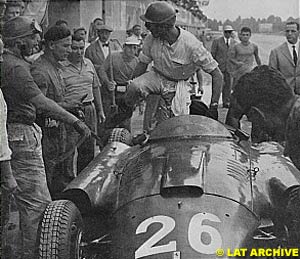 In the 1950s, it was not uncommon for Ferrari drivers to surrender their cars to the team leader if the senior driver's car broke down. In the 1956 Italian Grand Prix, Peter Collins surrendered his Lancia-Ferrari to Juan Manuel Fangio to let the Argentinean win the Drivers' Championship. Had Collins taken his Lancia-Ferrari home alone he would have been the Champion. As it turned out, Collins would never have another chance to win the Championship, dying behind the wheel of a Ferrari Dino at the Nurburgring in 1958.
In the 1950s, it was not uncommon for Ferrari drivers to surrender their cars to the team leader if the senior driver's car broke down. In the 1956 Italian Grand Prix, Peter Collins surrendered his Lancia-Ferrari to Juan Manuel Fangio to let the Argentinean win the Drivers' Championship. Had Collins taken his Lancia-Ferrari home alone he would have been the Champion. As it turned out, Collins would never have another chance to win the Championship, dying behind the wheel of a Ferrari Dino at the Nurburgring in 1958.
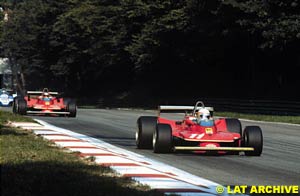 Ferrari won the Constructors' Championship in 1982 and in 1983, but a steady decline in competitiveness during the 1980s made Ferrari team orders irrelevant during the Michele Alboreto/ Stefan Johansson era. The next season when team orders, or lack thereof, became a burning issue at Maranello was the 1990 season, when Alain Prost was hired as team leader alongside Nigel Mansell. It was not surprising that this would end in a confrontation, since the concept of playing second fiddle to Prost did not sit well with the flamboyant Englishman, while Prost had left McLaren to get away from his temperamental former teammate Ayrton Senna.
Ferrari won the Constructors' Championship in 1982 and in 1983, but a steady decline in competitiveness during the 1980s made Ferrari team orders irrelevant during the Michele Alboreto/ Stefan Johansson era. The next season when team orders, or lack thereof, became a burning issue at Maranello was the 1990 season, when Alain Prost was hired as team leader alongside Nigel Mansell. It was not surprising that this would end in a confrontation, since the concept of playing second fiddle to Prost did not sit well with the flamboyant Englishman, while Prost had left McLaren to get away from his temperamental former teammate Ayrton Senna.
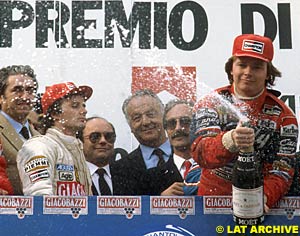 But all that was to change, since the arrival of Michael Schumacher to Maranello in 1996. Team orders have now been a "sine qua non" at Ferrari. From 1996 through 1999, Eddie Irvine's semi-confidential contract had a clause defining the terms of team orders that would ensure Schumacher's position on the race track. The irreverent Ulsterman grudgingly accepted these conditions and obeyed them reluctantly when required. The most memorable incident was the 1998 Austrian Grand Prix, when Irvine deliberately slowed to let Schumacher take third place. After the race, Ferrari concocted a "Cock-and-Bull" story about Irvine's brakes fading towards the end of the race, although the rules governing Formula One allow this type of team tactics.
But all that was to change, since the arrival of Michael Schumacher to Maranello in 1996. Team orders have now been a "sine qua non" at Ferrari. From 1996 through 1999, Eddie Irvine's semi-confidential contract had a clause defining the terms of team orders that would ensure Schumacher's position on the race track. The irreverent Ulsterman grudgingly accepted these conditions and obeyed them reluctantly when required. The most memorable incident was the 1998 Austrian Grand Prix, when Irvine deliberately slowed to let Schumacher take third place. After the race, Ferrari concocted a "Cock-and-Bull" story about Irvine's brakes fading towards the end of the race, although the rules governing Formula One allow this type of team tactics.
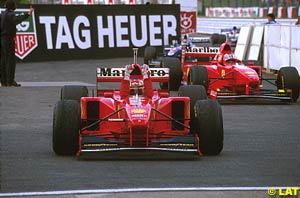 Irvine left Ferrari to lead the Jaguar team, while Rubens Barrichello signed a contract with Ferrari, which he himself exclaimed had no team order clauses. Is that so?
Irvine left Ferrari to lead the Jaguar team, while Rubens Barrichello signed a contract with Ferrari, which he himself exclaimed had no team order clauses. Is that so?
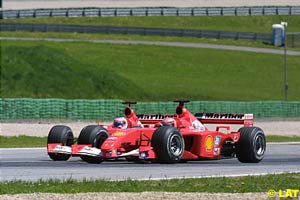 Given the history of the Scuderia, former Ferrari driver Niki Lauda, remarked that Barrichello should not have been surprised by this. "Schumacher had more points, what was Rubens expecting?" Lauda said in his usual abrasive style. "With Coulthard winning, Ferrari wanted to give Schumacher the most number of points, it's logical." Barrichello also got little sympathy from Jacques Villeneuve. "I don't understand why people are surprised, Rubens knew before signing with them that it would be this way. With Michael in the team everything must go his way," the French-Canadian said.
Given the history of the Scuderia, former Ferrari driver Niki Lauda, remarked that Barrichello should not have been surprised by this. "Schumacher had more points, what was Rubens expecting?" Lauda said in his usual abrasive style. "With Coulthard winning, Ferrari wanted to give Schumacher the most number of points, it's logical." Barrichello also got little sympathy from Jacques Villeneuve. "I don't understand why people are surprised, Rubens knew before signing with them that it would be this way. With Michael in the team everything must go his way," the French-Canadian said.
Please Contact Us for permission to republish this or any other material from Atlas F1.
|
Volume 7, Issue 20
Atlas F1 Special
Interview with Ralf
The Man who Powered Ilmor
For Whom the Bell Tolls
Spanish GP Review
The Austrian GP Review
Reflections from A1-Ring
Battle Lines
Farewall Austria
Columns
Qualifying Differentials
Season Strokes - the GP Cartoon
The Weekly Grapevine
> Homepage |